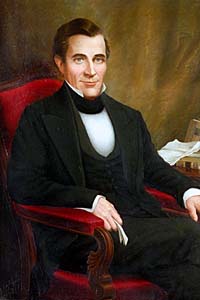Jared Irwin (politician, 1750)
Jared Irwin (* 1750 in Mecklenburg County , Province of North Carolina , † March 1, 1818 in Washington County , Georgia ) was a British- American politician of the Democratic Republican Party and governor of the state of Georgia.
Early years
The exact date of birth of Jared Irwin is unknown; but it is assumed that he was born around 1750. In 1757 his parents Rebecca Lawson and Thomas Irwin moved to what was then the British colony of Georgia. They settled in what would later become Burke County , where young Jared grew up. He took part in the War of Independence (1775–1783) and made it into the American army as a colonel . As a reward for his military service, he received land from the Washington County government in 1784. He spent most of his life in this district, where he also held various public offices.
Political rise
After the war, he became a Brigadier General in the Georgia Militia. In 1794 he drove together with General John Twiggs and 1200 militiamen Elijah Clarke , who, together with some settlers , had illegally occupied land west of the Oconee River . Clark's so-called Trans-Oconee Republic was peacefully disarmed and Irwin promised full amnesty to all settlers who voluntarily gave up the land. Irwin was a member of the Georgia Parliament in the 1780s and 90s. In this capacity he was also a member of the convention that ratified the American Constitution in 1787. In 1789 and 1795 he was instrumental in drafting and revising the constitution of the state of Georgia at two conventions.
Georgia Governor and End of Life
In January 1796, he was elected Governor of Georgia by Parliament. In this capacity, he first had to deal with the requirements of the new constitution passed the previous year. One decision was to move the capital from Augusta to Louisville . Another problem was supposed to be the so-called Yazoo Land scandal. The constitution provided a two-month transition period between the tenure of old Governor George Mathews and Irwin's inauguration. During those two months, illegal Mathews' land sales in western Georgia, known as the Yazoo Land Scandal, were exposed. In February 1796, the Georgia Parliament ratified a law reversing sales. Governor Irwin immediately put this law into effect with his signature.
In the same year a fire disaster occurred in Savannah , in which large parts of the city, but especially the commercial center, were destroyed. Irwin sent the militia to protect citizens from looting. In addition, part of the tax revenue from slave imports was made available to the city for reconstruction. Irwin's first term ended in January 1798. Later that year, he became president of a convention intended to revise the Georgia Constitution. Irwin was subsequently elected to the Georgia Senate and was its president in 1806. In this capacity he was constitutionally governed again on September 28, 1806, when Governor John Milledge resigned from his post. Irwin ended the term of office of his predecessor and was then confirmed for another term (1807-1809). 1807 was another relocation of the capital. This time the seat of government was moved from Louisville, which had only been occupied in 1796, to Milledgeville . This city remained the capital of Georgia until 1868 when Atlanta was made the capital. In 1809 Irwin finally resigned from the office of governor. He retired to his home in Washington County, where he died in 1818. The Irwin County , Georgia is named after him, as are the places Irwinton and Irwinville .
literature
- James F. Cook: The Governors of Georgia 1754-2004. 3rd revised and expanded edition. Mercer University Press, Macon GA 2005, ISBN 0-86554-954-0 .
- Judy Swaim Kratovil (Ed.): Georgia Governors' Journals, 1789–1798. County, State, and Militia Officers. Wolfe et al., Fernandina Beach FL et al. 2000.
Web links
- Jared Irwin at the National Governors Association (English)
- The New Georgia Encyclopedia (English)
- Jared Irwin in the database of Find a Grave (English)
| personal data | |
|---|---|
| SURNAME | Irwin, Jared |
| BRIEF DESCRIPTION | British-American Democratic-Republican Party politician and governor of Georgia |
| DATE OF BIRTH | 1750 |
| PLACE OF BIRTH | Mecklenburg County , Province of North Carolina |
| DATE OF DEATH | March 1, 1818 |
| Place of death | Washington County , Georgia |

